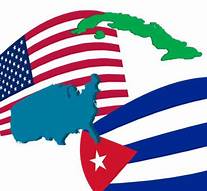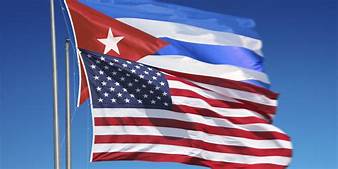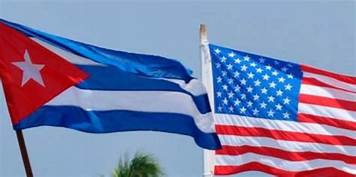DECISIONES DE LA ADMINISTRACION NORTEAMERICANA SOBRE SUS RELACIONES CON CUBA.
EE UU va a facilitar las remesas para el sector privado y aumentar la lista de productos exportables a la Isla. El asesor de seguridad de Biden descarta “un regreso a la política de Obama” con Cuba. Según la Oficina de Aduanas y Protección Fronteriza, en los últimos siete meses han llegado a territorio estadounidense más de 114.916 cubanos.
Entre las decisiones tomadas y movimientos que se preven estan:
Entre los compromisos futuros, el funcionario asesor de la Administracion norteamericana Juan Gonzalez declaro que entre los compromisos futuros, los derechos laborales serán una prioridad dentro de los derechos humanos y que se trabaja para expandir las remesas electrónicas, de manera que repercuta, también, sobre los privados, que podrán aumentar las importaciones. En este sentido, afirma que se va a expandir el número de productos que pueden ser exportados desde EE UU a la Isla y crear regulaciones que faciliten la formación para que los emprendedores puedan comerciar. Eso es clave y es central en esta política.
Juan Gonzalez, asesor de la Administracion y el cubanoamericano Alejandro Mayorkas, les fueron encomendadas varias instrucciones tras el 11J, la primera de ellas identificar a oficiales y represores cubanos para sancionarlos individualmente y, después, el apoyo al pueblo cubano, a las familias de los opositores y ofreciendo vacunas y otras ayudas canalizadas con organizaciones humanitarias.
Pasado aquel momento de emergencia, lo que se ha hecho ahora, indica González “no es un regreso a la política de Obama, son pasos prácticos” para que haya aviones que aterricen fuera de la capital o facilitar el envío de remesas. Una de las diferencias respecto a las medidas del anterior presidente demócrata, señala, es que con él se autorizaron los viajes individuales, mientras que Biden establece los grupales a través de organizaciones educativas o religiosas.
La inmigración ocupa un apartado importante en la entrevista y centra las preocupaciones de EE UU, que ha visto multiplicarse la llegada de cubanos a sus fronteras en este año de forma vertiginosa, especialmente desde que Nicaragua dejó de exigir visado a los viajeros de la Isla para facilitar la emigración alentada desde La Habana. Según la Oficina de Aduanas y Protección Fronteriza, en los últimos siete meses han llegado a territorio estadounidense más de 114.916 cubanos.
González afirma que los cubanos no desean emigrar, pero sus deseos de ser libres y tener comida o alimentos los empuja a marcharse por no encontrar solución en la Isla, de ahí que se hayan adoptado cambios aumentando la cantidad de visas procesadas en La Habana y restableciendo el programa de reunificación familiar. “Hoy en día es más barato ir con un coyote, con un traficante, que ir a Guyana y es lo que muchas personas están optando por hacer y están poniendo en riesgo sus vidas. Entonces queremos establecer los canales regulares de viaje”, defiende.
El funcionario explica que en la reunión mantenida con una delegación cubana a finales de abril sólo se abordó la cuestión migratoria y que él personalmente, junto con el subsecretario de Estado Brian Nichols hablaron con el jefe de la delegación cubana de derechos humanos. “El compromiso del presidente Biden, todo lo que hagamos nosotros en cuanto a Cuba y toda Latinoamérica va a ser de una forma transparente, con puertas abiertas y en consulta con el Congreso de los Estados Unidos y también con la comunidad”, defiende.
OBJETIVO COMUN DE LA ADMINISTRACION RESPECTO A CUBA…
Preguntado por las discrepancias que han mostrado políticos republicanos y líderes del exilio cubano en Miami con los cambios, González indica que comprende que haya diferencias y no se esté de acuerdo en todo, pero que sí hay un objetivo común, que es empujar un cambio democrático en Cuba. Además, niega tajantemente que no hayan consultado y tenido conversaciones con las Cámaras, que han durado todo el año largo que pasaron revisando la política hacia la Isla.
Consciente de las críticas que pueden venir porque deberán aumentar la presencia consular en Cuba, González pone por delante la visión del Gobierno. “Algunos lo verán como un premio para el régimen, nosotros lo vemos como una oportunidad para abogar por los intereses de Estados Unidos, tener intercambios directamente con los cubanos y resaltar el tema de los derechos humanos porque para nosotros tener relaciones diplomáticas no es un premio, es una oportunidad”.
También el funcionario se defiende de las críticas recibidas por anunciar los cambios justo cuando en Cuba se aprueba un Código Penal muy represivo y señala que a veces es imposible acertar con el momento, pero que la intención sigue siendo desmontar la teoría de que EE UU tiene la culpa de lo malo que pasa a en la Isla.
“Nosotros, buscando construir puentes y apoyar al pueblo cubano, tenemos una forma de quitar esa excusa”, alega. Además, añade que el 11J ha demostrado que la población está perdiendo el miedo y que el régimen tiene un apoyo popular menguante. “Es tiempo ya para que los cubanos determinen el futuro que quieren (…) no que nosotros digamos qué es lo que tienen que hacer, sino darles ese empoderamiento y ese apoyo para que ellos sean los líderes de la conversación”.
DECISIONS OF THE NORTH AMERICAN ADMINISTRATION ON ITS RELATIONS WITH CUBA
The US is going to facilitate remittances for the private sector and increase the list of exportable products to the Island. Biden’s security adviser rules out “a return to Obama’s policy” with Cuba. According to the Customs and Border Protection Office, in the last seven months, more than 114,916 Cubans have arrived in US territory.
Among the decisions made and movements that are foreseen:
Among the future commitments, the advisory official of the US Administration, Juan Gonzalez, stated that among the future commitments, labor rights will be a priority within human rights and that work is being done to expand electronic remittances so that it also affects the private ones, which will be able to increase imports. In this sense, he affirms that the number of products that can be exported from the US to the Island will be expanded and regulations will be created that facilitate training so that entrepreneurs can trade. That is key and is central to this policy.
Juan Gonzalez, adviser to the Administration, and Cuban-American Alejandro Mayorkas, were entrusted with several instructions after 11J, the first of which was to identify Cuban officials and repressors in order to sanction them individually and, later, to support the Cuban people, the families of the opponents and offering vaccines and other aid channeled through humanitarian organizations.
After that moment of emergency, what has been done now, González indicates, “is not a return to Obama’s policy, they are practical steps” so that there are planes that land outside the capital or facilitate the sending of remittances. One of the differences with respect to the measures of the previous Democratic president, he points out, is that with him individual trips were authorized, while Biden establishes group trips through educational or religious organizations.
Immigration occupies an important section in the interview and focuses on the concerns of the United States, which has seen the arrival of Cubans multiply at its borders this year at a vertiginous rate, especially since Nicaragua stopped requiring a visa for travelers from the island to facilitate emigration encouraged from Havana. According to the Customs and Border Protection Office, in the last seven months, more than 114,916 Cubans have arrived in US territory.
González affirms that Cubans do not want to emigrate, but their desire to be free and have food or food pushes them to leave because they cannot find a solution on the island, which is why changes have been adopted, increasing the number of visas processed in Havana and reestablishing the family reunification program. “Today it is cheaper to go with a coyote, with a smuggler, than to go to Guyana and that is what many people are choosing to do and are putting their lives at risk. So we want to establish regular travel channels,” he defends.
The official explains that in the meeting held with a Cuban delegation at the end of April, only the migration issue was addressed and that he personally, along with Undersecretary of State Brian Nichols, spoke with the head of the Cuban human rights delegation. “President Biden’s commitment, everything we do regarding Cuba and all of Latin America is going to be transparent, with open doors and in consultation with the United States Congress and also with the community,” he defends.
COMMON OBJECTIVE OF THE ADMINISTRATION REGARDING CUBA…
Asked about the discrepancies that Republican politicians and Cuban exile leaders in Miami have shown with the changes, González indicates that he understands that there are differences and they do not agree on everything, but that there is a common goal, which is to push for a democratic change. in Cuba. In addition, he categorically denies that they have not consulted and had conversations with the Chambers, which have lasted the entire year that they spent reviewing the policy towards the Island.
Aware of the criticism that may come because they will have to increase the consular presence in Cuba, González puts forward the Government’s vision. “Some will see it as a prize for the regime, we see it as an opportunity to advocate for the interests of the United States, have direct exchanges with Cubans, and highlight the issue of human rights because for us having diplomatic relations is not a prize. It’s an opportunity.”
The official also defends himself against the criticism received for announcing the changes just when a very repressive Penal Code is being approved in Cuba and points out that sometimes it is impossible to get the timing right, but that the intention is still to dismantle the theory that the United States has blamed for the bad things that happen to the Island.
“We, seeking to build bridges and support the Cuban people, have a way to remove that excuse,” he alleges. Furthermore, he adds that 11J has shown that the population is losing fear and that the regime has dwindling popular support. “It is time for Cubans to determine the future they want (…) not for us to say what they have to do, but to give them that empowerment and that support so that they are the leaders of the conversation.”
Agencies. 14yMedio. Radio Marti. Extractos. Excerpts. Internet Photos. Arnoldo Varona. www.TheCubanHistory.com
THE CUBAN HISTORY, HOLLYWOOD.



 DECISIONES de la Administración Norteamericana sobre sus Relaciones con Cuba. * DECISIONS of the North American Administration on its Relations with Cuba.
DECISIONES de la Administración Norteamericana sobre sus Relaciones con Cuba. * DECISIONS of the North American Administration on its Relations with Cuba.





